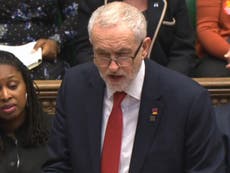Donald Tusk sounded tough but it was worth listening to what he didn’t say
The EU President has to pose as the defender of the interests of the 27, but if you read between the lines he would like to do a deal

Donald Tusk was like a disappointed parent, with a “more in sorrow than in anger” tone, understanding why Theresa May was demanding the impossible but trying to explain why it couldn’t be done.
“I fully understand and respect Theresa May’s political objective to demonstrate at any price that Brexit could be a success and was the right choice,” he said. “But sorry, it is not our objective.”
With the same air as Michel Barnier last week of explaining something patently obvious to a distracted student, Tusk said: “There is no possibility to have some exclusive form of single market for some parts of our economies. A pick-and-mix approach for a non-member state is out of the question.”
So much for the standard EU rhetoric. Brexit is going to hurt, and it is going to hurt you more than us. We’ll be as helpful as we can be, but we won’t compromise on the sanctity of the single market and you will have to live with the consequences.
On the other hand, what was significant was what Tusk didn’t say, and what wasn’t in the draft guidelines for negotiating the trade deal that he published just before he spoke.
He didn’t mention the Irish border, and nor did the document. Nor did he mention financial services, and the document only mentioned services in general. Those are two of the most difficult areas, so the implication could be that the EU side is willing to compromise on them.
What is in the document is confirmation of zero tariffs on goods, although I am told this has always been on offer. And in his comments, Tusk added his views of Donald Trump’s declaration of trade war. This may seem a separate subject, but the message was that the EU and the UK are still on “the same team” in opposition to protectionism.
The underlying message is that the EU and the UK are committed, unlike the US, to free trade and the minimising of barriers. That ought to mean that, despite the “complications” of Brexit, Tusk shares Theresa May’s ambition of as frictionless a trade relationship as possible.
Although Tusk and his draft guidelines formally set out the EU’s hardline opening negotiating position, both his comments and the document were short and unspecific.
I thought Tusk’s warning that the UK “cannot have the rights of Norway with the obligations of Canada” was interesting. This was a direct response to the line in Theresa May’s Mansion House speech: “We will not accept the rights of Canada and the obligations of Norway.”
That suggests that both sides should be able to agree a deal in which the UK has rights somewhere between Norway (in the single market) and Canada (just another non-member state), and obligations to match.
I may be reading too much into this, because Tusk did also say: “We will do our best as we did with other partners such as Canada recently – but anyway it will only be a trade agreement.”
But I suspect that Tusk, although he is a disappointed parent, is really a liberal disappointed parent, who wants to be firm in teaching that there are boundaries, but then easygoing and relaxed about their application.
He and Theresa May seem a long way apart, but my view is that there is a deal to be done.



Join our commenting forum
Join thought-provoking conversations, follow other Independent readers and see their replies